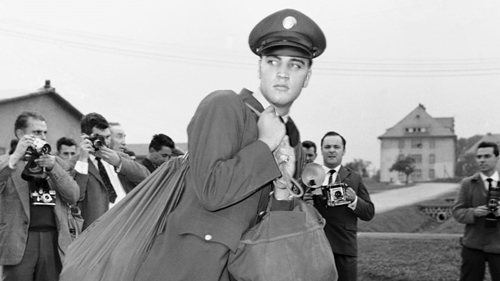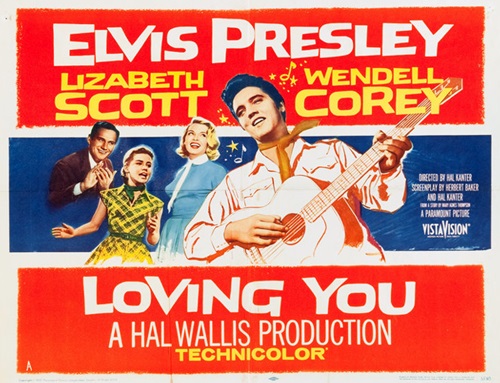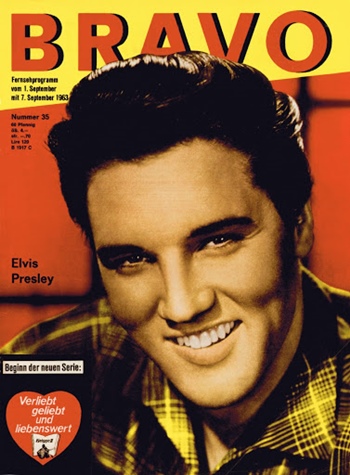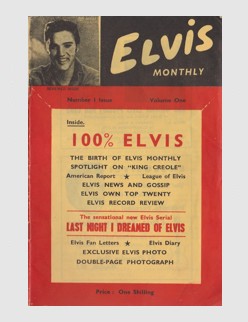 |
 |

Inventing Elvis: An American Icon in a Cold War World by Mathias Haeussler Reviewed by Nigel Patterson, December 2020 Bloomsbury Academic, Great Britain, 2020, Hardback/Paperback/ePDF/ebook, 209 pages, Not illustrated, ISBN13: 978-1350107656 (paperback) This new (academic) book by Mathias Haeussler, Assistant Professor of Modern European History at Regensburg University in Bavaria, is a challenging, but thought provoking exploration of Cold War political-cultural history, the growth of trans-national youth culture, and how changing perceptions of Elvis Presley played out during the 1950s, 1960s and 1970s. Hauessler’s expressive narrative highlights how Elvis’ identity reflected attitudes around US culture. His book also touches on important, and often contentious issues that existed, and in some cases continue to exist, around Elvis, such as race (discussed disparately as the alleged appropriation of Black American music by Elvis in the 1950s and the absence of race - non-white American characters - in Elvis movies in the 1960s). A strength of the author’s research and writing is that the outcome is a multi-varied and importantly holistic account, accounting for contrary views. Key themes underpinning the narrative are Elvis being the first star to be successful on multi-platforms and the move from a “passive” mass culture to “active” popular culture, where the recipient (consumer) has “agency” in pushing what they like and want onto the market.
Haeussler look at Elvis’ role as a protagonist in Cold War politics and the rise of a global youth culture is complex and evolutionary:
While Elvis first became a star in his home country, his appeal quickly spread around the globe. Haeussler gets to the nub of the reason:
The theme is reinforced around developments in Western Germany:
Professor Haeussler also notes the importance of Elvis’ body movements in his success:
One country where Elvis became persona non grata was Cuba, where Fidel Castro launched an ‘all-out attack on Elvis during a speech at the University of Havana’. The outcome was dramatic:
How important was Elvis’ role during the Cold War? Haeussler’s analysis is measured and he does not consider that Elvis and the Cold War were inter-dependent but occurred at the same time. He does note:
Hauessler writes that by the time Elvis returns from the Army in 1960, the narrative of him as subversive and a threat to the morals of America’s youth, has played out.
Two key themes in the author’s discussion of Elvis and the Cold War in the 1960s are the growing influence of key Elvis fan club organs and the role of Elvis’ films. On the former element, he comments:
As a primary example, Haeussler notes that Albert Hand’s, Elvis Monthly, within one year of its first issue in January 1960, had become one of the ‘major organs of the Elvis fan scene’. He also comments that by 1962 the Monthly was a major news hub for fans worldwide:
He also records how Elvis Monthly facilitated global fan interest:
Haeussler notes that Elvis’ four films in the 1950s were perceived, “’not always accurately’, as part of the rock and roll genre. On his return from the Army, the Colonel realised that the most money could be made from Hollywood. In discussing this issue, Haeussler references Paul Simpson’s book, Elvis Films FAQ, and records:
The author pertinently observes:
In considering Elvis’s films in the 1960’s, Haeussler includes various critic and fan reviews that symbolise why Elvis was probably never going to realise his dream of being a serious actor – his audience would never accept this – as evidenced by the far superior box-office receipts enjoyed by films such as Blue Hawaii compared to the less than stellar receipts and fan views about films like Wild in the Country and Flaming Star (despite their respective merits). The author posits that as highly popular exports of American culture, Elvis’ films projected U.S. ideals of affluence, materialism, freedom and a sense of optimism, to non-western countries, initially to youth audiences and by the early 1960s, to families. Elvis’ films promoted the right messages of the American democratic-capitalist “way of life”, complementing official US government propaganda. These elements neatly complemented the narrative of Elvis coming from a poor background to achieve incredible success and wealth. Interestingly, in this context, Haeussler comments about Elvis ‘the person’:
To the reviewer, this implies it was Elvis’ image, rather than Elvis the person, that was influential in Cold War politics, at least during his Hollywood years. While Elvis’ role in the Cold War context is, arguably, less well defined during the 1960s period - largely due to how quickly Elvis’ films became passe and Elvis’ reclusiveness from the public and the absence of him touring – the author’s analysis of this period is still thought provoking. Appropriately, Haeussler notes that set against the background of a burgeoning civil rights movement, the peace movement, and the late 1960s assassinations of Robert Kennedy and Martin Luther King, ‘Elvis’s movies seemed merely out of touch; they had become anachronistic relicts of a bygone age.’ To many fans, Elvis’ comeback after years in the Hollywood wilderness, is symbolised by two events – the ’68 Comeback Special and Elvis’ recordings at the American Sound Studio where he recorded the seminal album, From Elvis in Memphis. Haeussler suggests these are only part of the story:
Referencing last year’s book by Richard Zoglin, Elvis in Vegas, Haeussler clarifies the theme:
This frames the final stanza of Inventing Elvis where Haeussler addresses Elvis’ excesses and decline during the 1970s. These mirror a time in American political-cultural history when it was undergoing a period of reflection brought on by several destabilising factors including the disaster of the Vietnam War and the assassinations of JFK, his brother Robert, and Martin Luther King. As Elvis’ excesses and decline were brought on by his fame and status, the tensions in America reflected its unparalleled success in establishing its materialistic culture and imposing its political-military might around the world. Elvis’ decline confirmed the negative side of the materialistic nature of American society. Similarly, America was being confronted by the by-products of its success. In relation to the significance of Elvis, the author observes that Elvis as a symbol of US culture manifested itself following his premature death in 1977, with two conflicting arguments:
The opposing view came from columnist, Mike Royko:
Further, the trans-national importance of Elvis became abundantly clear in August 1977:
Verdict: Inventing Elvis; An American Icon in a Cold War World is a powerful and intriguing release which offers the reader a fresh perspective with which to consider Elvis’ impact on the world. By framing Elvis’ rise and career in the Cold War context and interweaving the rise of a global youth culture, Professor Haeussler is able to paint an intricate picture of how changes in both western and non-western countries were influenced by factors beyond just the political.
Coming soon to EIN - an interview with the author, Mathias Haeussler Book Review by Nigel Patterson. Buy Inventing Elvis: An American Icon in a Cold War World
|
|






